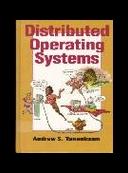Книга: Distributed operating systems
10.7. DISTRIBUTED FILE SYSTEM
The last component of DCE that we will study is DFS (Distributed File System) (Kazar et al., 1990). It is a worldwide distributed file system that allows processes anywhere within a DCE system to access all files they are authorized to use, even if the processes and files are in distant cells.
DFS has two main parts: the local part and the wide-area part. The local part is a single-node file system called Episode, which is analogous to a standard UNIX file system on a stand-alone computer. One DCE configuration would have each machine running Episode instead of (or in addition to) the normal UNIX file system.
The wide-area part of DFS is the glue that puts all these individual file systems together to form a seamless wide-area file system spanning many cells. It is derived from the CMU AFS system, but has evolved considerably since then. For more information about AFS, see (Howard et al. 1988; Morris et al., 1986, and Satyanarayanan et al., 1985). For Episode itself, see (Chutani et al., 1992).
DFS is a DCE application, and as such can use all the other facilities of DCE. In particular, it uses threads to allow multiple file access requests to be served simultaneously, RPC for communication between clients and servers, DTS to synchronize server clocks, the directory system to allow file servers to be located, and the authentication and privilege servers to protect files.
From DFS' viewpoint, every DCE node is either a file client, a file server, or both. A file client is a machine that uses other machines' file systems. A file client has a cache for storing pieces of recently used files, to improve performance. A file server is a machine with a disk that offers file service to processes on that machine and possibly to processes on other machines as well.
DFS has a number of features that are worth mentioning. To start with, it has uniform naming, integrated with CDS, so file names are location independent. Administrators can move files from one file server to another one within the same cell without requiring any changes to user programs. Files can also be replicated to spread the load more evenly and maintain availability in the event of file server crashes. There is also a facility to automatically distribute new versions of binary programs and other heavily used read-only files to servers (including user workstations).
Episode is a rewrite of the UNIX file system and can replace it on any DCE machine with a disk. It supports the proper UNIX single-system file semantics in the sense that when a write to a file is done and immediately thereafter a read is done, unlike in NFS, the read will see the value just written. It is conformant to the POSIX 1003.1 system-call standard, and also supports POSIX-conformant access control using ACLs, which give flexible protection in large systems. It has also been designed to support fast recovery after a crash by eliminating the need to run the UNIX fsck program to repair the file system.
Since many sites may not want to tinker with their existing file system just to run DCE, DFS has been designed to provide seamless integration over machines running 4.3 BSD, System V, NFS, Episode, and other file systems. However, some features of DFS, such as protection by ACLs, will not be available on those parts of the file system supported by non-Episode servers.
- Integrated Secure Communications System
- 5.3. TRENDS IN DISTRIBUTED FILE SYSTEMS
- Setting Up Guest Operating Systems
- 10.16. Реализация с использованием семафоров System V
- 1.5 Number Systems
- 5 Distributed File Systems
- 5.1. DISTRIBUTED FILE SYSTEM DESIGN
- 5.2. DISTRIBUTED FILE SYSTEM IMPLEMENTATION
- 5.3.5. Fault Tolerance
- 5.3.2. Scalability
- 3.4.4. Concurrency Control
- 5.1.2. The Directory Server Interface




